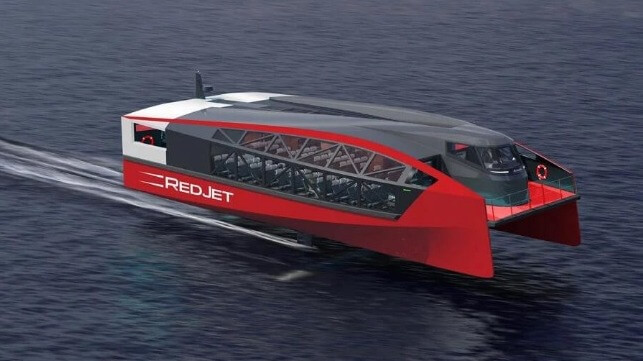First Hydrofoiling Electric High-Speed Ferry to Launch in the UK in 2025

UK ferry operator Red Funnel confirmed that it plans to introduce a high-performance, emission-free high-speed vessel on its service crossing the Solent in late 2025. The unique vessel is an all-electric e-foiling passenger ferry developed by Artemis Technologies.
The design was introduced in 2022 reporting that the fast catamaran will ride above the water on three foils, and its all-electric drive will push it to speeds as high as 36 knots. Artemis has said that it expects to get a range of 70 nautical miles out of the vessel at a 25-knot cruise speed, with zero emissions and higher efficiency. Once in service, they are projecting the electric ferry will initially save 3,700 tonnes of CO2 per year and that it can be increased to approximately 4,150 tonnes when electricity from renewable energy sources is available.
Passenger capacity will be up to 150, and while hydrofoiling, the ride will be more comfortable, with less vessel motion. Wake effects will also be minimized, says Artemis.
Artemis said without naming the other companies that Red Funnel will be one of three ferry operators adopting the technology. The company reported in May 2024 that it had its first vessels under construction.
The company's first vessel to demonstrate the hydrofoiling technology is a 12-meter workboat. It was put in service operation along the Belfast waterfront to demonstrate the concept. The company has also received financial grants from the UK as part of the efforts to promote new green technologies.
Red Funnel is one of the oldest operating ferry companies tracing its origins to 1861. Today, the company reports it carries 3.4 million passengers and 860,000 vehicles across the Solent between Southampton, England and West Cowes on the Isle of Wight.
The company has been running a fleet of high-speed passenger ferries for more than two decades on the route. This spring they announced the sale of the Red Jet 4, which was built by North West Bay Ships in Tasmania in 2003. Powered by two MTU diesel engines, each driving an MJP waterjet to give a service speed of 35 knots the vessel carried up to 271 seated passengers and four crew. It is going to an operator in South Korea, but Red Funnel continues to operate two other high-speed vessels, Red Jet 6 built in 2016 and Red Jet 7 built in 2018. The passenger jet ferries make the transit in approximately 28 minutes while the traditional vehicle ferries take approximately an hour for the 12-mile trip.
Artemis recently reported that it entered into an agreement with DNV to collaborate to ensure that the testing and certification processes ensure that the safety requirements under the relevant international regulations and DNV rules are met or exceeded.
Red Funnel says it will be working with Artemis over the coming months for testing and sea trials of the vessel. Its high-speed crews will also be undergoing training to be prepared for the arrival of the new ferry.
No comments:
Post a Comment